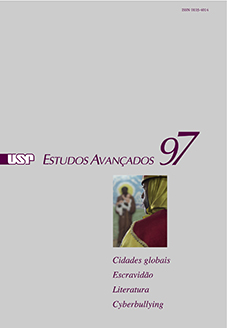Um país dentro da casa: o caráter político do espaço doméstico em três romances brasileiros
DOI:
https://doi.org/10.1590/s0103-4014.2019.3397.015Keywords:
“Casa-grande”, Patriarchy, Family, Prison, MadnessAbstract
From an analysis of the space of the home, a comparative study of the novels Fogo Morto, by José Lins do Rego (1943), A menina morta, by Cornélio Penna (1954), and Crônica da casa assassinada, by Lúcio Cardoso (1959), allows a glimpse into a complex framework of relations between novelistic form and Brazilian society. These are novels that take place in the interior or in the shadow of the domestic space, whose meaning points to the specificities of Brazilian society anchored in the structure and functioning of the slave-based mode of production, expressed by the significant presence of the home as casa-grande. By formulating local specificities, the house-country is transfigured into a prison, a lunatic asylum and tomb space.
Downloads
Downloads
Published
Issue
Section
License
Estudos Avançados não celebra contrato de cessão de direitos autorais com seus colaboradores, razão pela qual não detém os direitos autorais dos artigos publicados. Os interessados em reproduzir artigos publicados na revista devem necessariamente obter o consentimento do autor e atribuir devidamente os créditos ao periódico.


